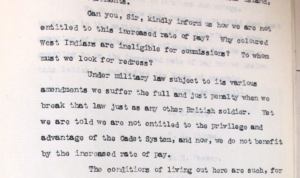For those starting from the Caribbean there was a variety of routes to join the military in both the First and Second World Wars. Inhabitants of the Caribbean joined British and allied armed forces through a variety of routes. Some enlisted in the Caribbean itself. Others travelled to the UK to enlist, often paying their own fare to do so. Yet others travelled to North America and signed up with Canadian or American armed forces.
If you know an individual served, but don’t know more than that, this can make finding any records tricky, because their record (if it remains) could be in a number of places, in different countries. In order to meet that challenge, the best place to start your research might not be an archive. If you know that an individual served in the British or allied armed forces in the First or Second World War but don’t know more details about their military service then a good place to begin is with online ‘roll of honour’ compilations. Databases such as the Imperial War Museum’s Lives of the First World War database, the Caribbean Roll of Honour website, or the database of the Commonwealth War Graves Commission, allow you to search for individuals by name across a variety of potential types and locations of records. When you find someone’s name in one of these rolls of honour, you may also find more details about their service, and this would allow you to focus the next stages of your research.
The history of Caribbean contributions to British military effort in the 20th century also needs to recognise the roles in which colonialism, colour bars and racism shaped the experience of individuals. Books such as Black Salt by Ray Costello, Black Poppies by Stephen Bourne, Mark Johnson’s Caribbean Volunteers at War or Marika Sherwood’s World War II: Colonies and Colonials, provide some context to the role that ideas about ‘race’ played in determining attitudes to soldiers, sailors and airmen who were not considered to be ‘white’.
For much of the 20th century members of the British armed forces with African or Asian heritage were paid less than ‘white’ servicemen and women in similar roles. They were frequently discriminated against in opportunity, medical treatment, and in pension rights. Those discriminated against often fiercely opposed that injustice. sometimes winning recognition but in other circumstances facing severe punishment. In terms of doing family history, the colour bars that were in place in different armed forces at different moments has had a legacy on the types of records that might remain for individuals, and on how they can be accessed.

This petition, signed in 1918 by 12 members of the British West Indies Regiment, was supported by senior officials and resulted in members of the British West Indies Regiment receiving the same pay increases as other regiments. However, other attempts by Caribbean troops to gain equal conditions and pay were treated and punished, as mutinies. Catalogue ref: CO 28/294/24
